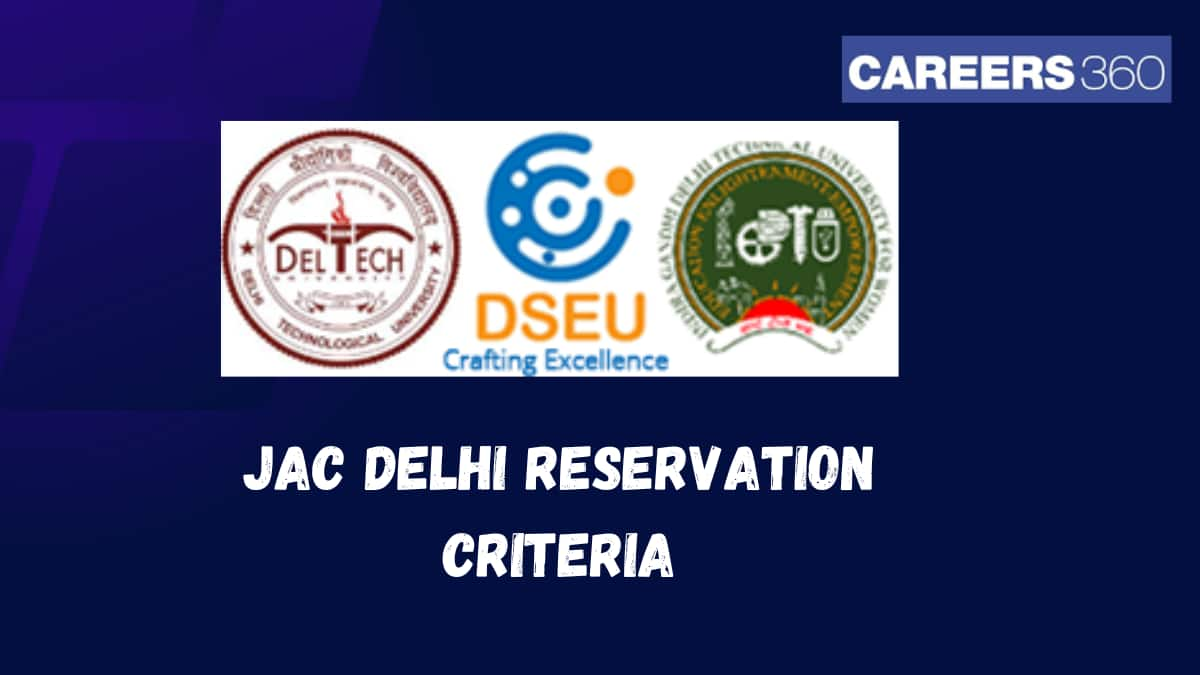Jain University B.Tech Admissions 2026
98% Placement Record | Highest CTC 81.25 LPA | NAAC A++ Accredited | Ranked #62 in India by NIRF Ranking 2025 | JEE & JET Scores Accepted
JAC Delhi Reservation Criteria 2025 - Joint Admission Committee, Delhi has released the JAC Delhi 2025 reservation criteria through the information brochure. Candidates can check the JAC Delhi 2025 reservation criteria on the official website, jacdelhi.admissions.nic.in. The reservation criteria of JAC Delhi 2025 is updated on this page. Institutes offering admissions through JAC Delhi 2025 have a reservation policy for various categories. The JAC Delhi reservation criteria for Scheduled Castes (SC) and Scheduled Tribes (ST) are 15% and 7.5% respectively. JEE Main qualified candidates will be eligible for admission on reserved seats as per the JAC Delhi reservation criteria for BTech.

The JAC Delhi reservation 2025 is decided by complying with the rules established by the government. Candidates who seek the benefit of reservation criteria have to produce the relevant documents at the time of JAC Delhi Counselling. Read the complete article to know all about the reservation criteria of JAC Delhi 2025.
Category of Candidates | Reservation Percentage |
Scheduled Castes (SC) | 15% |
Scheduled Tribes (ST) | ST for DTU, IGDTUW, NSUT, IIITD and DSEU - 7.5% |
Other Backward Classes Non-Creamy Layer (OBC-NCL) | 27% |
Economically Weaker Sections (EWS) | 10% |
Defence | 5% |
Persons with Disability (PD) | 5% |
Kashmiri Migrants (KM) | DTU and NSUT - 1 seat |
IIITD - 1 seat | |
IGDTUW - 1 seat | |
| DSEU - 1 seat | |
Single Girl Child at DTU | 1 seat |
| Single Girl Child at IGDTUW | 2 seats |
Candidates belonging to any of the reserved categories have to prove their status of reservations with original documents issued by the authorized person. Given below are the specifications regarding the JAC Delhi 2025 reservation criteria:
98% Placement Record | Highest CTC 81.25 LPA | NAAC A++ Accredited | Ranked #62 in India by NIRF Ranking 2025 | JEE & JET Scores Accepted
Merit Scholarships | NAAC A+ Accredited | Top Recruiters : E&Y, CYENT, Nvidia, CISCO, Genpact, Amazon & many more
*The property held by a ‘family’ in different locations or different places/ cities would be clubbed while applying the land or property holding test to determine EWS status.
*Candidates need to produce an ‘Income and Asset Certificate’ issued by the competent authorities.
Given below is the order of priority for candidates applying for JAC Delhi reservation under the Defence category.
Particulars | Details |
Priority 1 | Widow/ Ward of Defence personnel killed in action |
Priority 2 | Wards of personnel disabled in action and boarded out from service |
Priority 3 | Widows/ wards of Defence Personnel who died while in service when the death is attributable to military service. |
Priority 4 | Wards of personnel disabled in service and boarded out with disability attributable to military service. |
Priority 5 | Wards of serving Defence Personnel and ex-servicemen/ Para Military/ Police personnel who have received any of the following Gallantry Awards:
|
Priority 6 | Wards of Ex-Servicemen. |
Priority 7 | Wives of:
|
Priority 8 | Wards of Serving Personnel. Priority IX |
Priority 9 | Wives of Serving Personnel |
Frequently Asked Questions (FAQs)
Yes, the JAC Delhi 2025 reservation criteria has been released along with the brochure.
Among top 100 Universities Globally in the Times Higher Education (THE) Interdisciplinary Science Rankings 2026
Recognized as Institute of Eminence by Govt. of India | NAAC ‘A++’ Grade | Upto 75% Scholarships
Highest CTC 44.14 LPA | UGC Approved | 1600+ Recruiters | 100% Placement
NAAC A++ Grade | Recognized as Category-1 Deemed to be University by UGC | 41,000 + Alumni Imprints Globally
India's youngest NAAC A++ accredited University | NIRF rank band 151-200 | 2200 Recruiters | 45.98 Lakhs Highest Package
NAAC A++ Accredited | Accorded institution of Eminence by Govt. of India | NIRF Rank #3